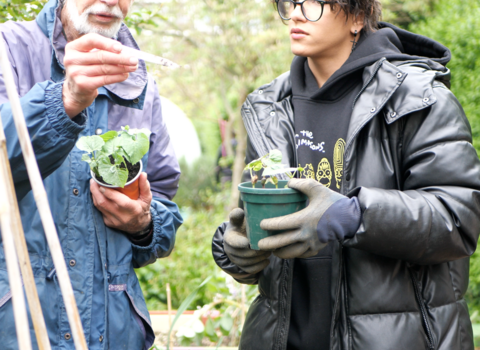We’ve seen first-hand how communities can be transformed – creating incredible oases for wildlife and people, even in the most densely populated cities, like Portsmouth. Whether it be turning a flytipping hotspot into a community orchard, restoring neglected flower beds on the highstreet, or creating ‘wilder streets’, with swift boxes, hedgehog highways and pollinator patches- the power of people acting together cannot to be underestimated. Initiatives like these also help contribute towards safer, more united communities of people who are not just more connected to nature, but reap the benefits of it too.
Research has shown time and time again that being in nature is good for our mental and physical health. The NHS could save an estimated £2.1 billion every year in treatment costs if everyone in England had access to good quality green space. Taking learning outdoors benefits children’s mental health and develops a deeper appreciation for the environment and their role in protecting it. Building a lasting connection with nature in childhood shapes our adult lives and attitudes towards wildlife, climate change, and how we choose to live.
However, more than one third of the population - nearly 9.5 million households in England – are unable to access green places near their home. In Portsmouth, the average public green space is only 10.8m2 per person.
Improving access to natural, wildlife-rich places where we live, learn and work will transform people’s lives,. We need national policy to empower and support local communities and groups to enhance their local areas; helping deliver the benefits of nature for everyone.
What needs to change?
-
Reduce barriers and invest in community conservation action - Local authorities and other agencies, such as highways, should be expected to work alongside communities to address inequalities in access and drive improvements to natural spaces in their local area, including supporting and enabling groups of local people to takietake practical action to enhance and expand green spaces for wildlife and people to enjoy Statutory guidance for community engagement and nature-positive management of the public estate, would support all relevant parties to collaborate and play their part in nature’s recovery
-
A natural health service - The Wildlife Trusts and organisations from creative arts, sport and physical activity sectors have a critical role to play in boosting our national health and wellbeing. We believe green social prescribing must be integrated into health and social care services in the community. It makes economic sense and has the potential to deliver improved health and well-being at scale. Our focus locally is to use our expertise in nature connection and nature- centred activities to train and support other community organisations to be able to use nature in their practice and offer green social prescribing to their service-users.
-
Wilder Schools New statutory guidance to deliver learning outdoors for all would ensure our schools support happier, more confident children who understand their impact on our natural world. All formal educational settings should be enabled to provide opportunities for connection to nature as well as guiding greater understanding of the challenges facing nature and the climate. Training and support should be available for existing and future teachers to build confidence and skills in integrating nature into the curriculum and embedding pro-environmental action within the fabric of the school. .
-
Greener neighbourhoods – We need more investment in accessible green natural spaces for everyone. The creation of appropriate, high quality green infrastructure close to where people live has multiple benefits. Not only can this green space offer valuable habitat in its own right, it also helps to reduce recreational pressure on sensitive wildlife-rich sites, and can play a role in building resilience to climate impacts, such as significantly cooling urban areas.. We need the next government to encourage more urban greening through planning policy and targeted support, such as the pocket parks fund, to help deliver more trees and shading for our towns and cities.
-
For more information:

